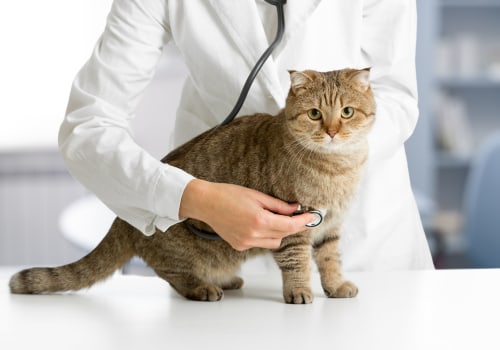As a cat owner, it's important to understand the risks of parasites and how to prevent them. Parasites are a common concern for cats, and can cause serious health issues if left untreated. This article provides a comprehensive overview of parasite prevention for cats, so you can keep your feline friend safe and healthy. We'll discuss the types of parasites that affect cats, the symptoms to look out for, and the best preventative measures to help keep your cat parasite-free. We will also explore the various treatments available, as well as how to properly administer them.
Finally, we'll go over the importance of regular veterinary exams to ensure your cat remains parasite-free. By the end of this article, you'll be armed with the knowledge to make sure your cat is protected from parasites and enjoys a long, healthy life. Parasites are a common issue in cats, ranging from annoying and irritating to deadly. It is important to understand the different types of parasites that can affect cats, the symptoms they cause, and how to prevent them.
Fleas are one of the most common parasites affecting cats. They are small, wingless insects that feed on the blood of their hosts. Fleas can spread quickly and cause severe itching and skin irritation. Fleas can also be carriers of other parasites, including tapeworms.
Ticks are small, eight-legged creatures that attach themselves to cats and feed on their blood. They can spread diseases such as Lyme disease, Rocky Mountain spotted fever, and ehrlichiosis.
Mites
are tiny parasites that live on the skin and in the ears of cats. They can cause severe itching and inflammation, as well as infections.Roundworms and hookworms are two common intestinal parasites that can affect cats. These worms can cause vomiting, diarrhea, weight loss, and anemia.
Tapeworms
are long, flat worms that live in the intestines of cats. Symptoms include weight loss, diarrhea, vomiting, and poor coat condition.Tapeworms can also be spread to humans.
Heartworms
are potentially deadly parasites that can affect cats. Symptoms include coughing, difficulty breathing, weight loss, and lethargy. It is important to recognize the signs and symptoms of each type of parasite in order to prevent them.Regular flea and tick treatments should be used to prevent infestations. Additionally, deworming should be done on a regular basis to prevent roundworms and hookworms from taking hold. Heartworm prevention is also essential for cats living in areas where mosquitoes are prevalent. Regular visits to the vet are important for kittens in particular, as they should be seen for a checkup and parasite prevention treatment shortly after adoption.
Cleaning litter boxes regularly is also an important part of parasite prevention in cats. The consequences of not preventing or treating parasites in cats can be serious. Skin irritation, digestive issues, anemia, organ failure, and even death can occur if left untreated. It is important to keep an eye out for symptoms of parasites and take steps to prevent them with regular treatments.
Preventing Parasites in Cats
The best way to prevent parasites in cats is through regular flea and tick treatments, deworming, and heartworm prevention. It is important to note that flea and tick treatments may need to be administered throughout the year, depending on the climate and the type of treatment used.In addition, some flea and tick treatments are only effective for a certain length of time, so it is important to re-administer the product as needed. Deworming cats is a must for all pet owners. It is recommended to deworm kittens at least twice in their first year of life, and then once a year thereafter. The type of deworming product used will depend on the type of parasite present. Some parasites can be treated with an oral medication, while others may require an injection. Finally, heartworm prevention is essential for all cats.
Heartworm is a serious and potentially deadly disease that is caused by parasites in the bloodstream. Heartworm prevention should be given monthly year-round, regardless of climate or the presence of mosquitoes. Your veterinarian can provide more information about which heartworm preventative is best for your cat. By following these steps and consulting with your veterinarian, you can help keep your cat healthy and free from parasites.
Potential Consequences
Failing to prevent or treat parasites in cats can have dire consequences.It's important to understand what these potential consequences are and why it's essential to take appropriate preventive measures. One of the most common consequences of not treating a parasitic infection in cats is skin irritation. This can cause cats to scratch and bite at their skin, potentially leading to infection and other skin-related issues. Digestive issues, such as vomiting and diarrhea, can also occur due to a parasitic infection.
If left untreated, this can lead to malnutrition and dehydration. Anemia is another potential consequence of an untreated parasitic infection. Anemia is a condition in which there are not enough red blood cells to adequately oxygenate the body's tissues. This can lead to weakness, lethargy, and even organ failure in extreme cases.
Finally, in some cases, a severe parasitic infection can lead to death. It's important to remember that parasites can be deadly, so it's essential to take preventive measures and seek treatment as soon as possible if you suspect your cat has a parasitic infection.
Cleaning Litter Boxes
Cleaning litter boxes is an essential part of keeping cats healthy and free from parasites. Regularly cleaning and changing the litter can help reduce the risk of parasites, as well as other diseases that cats may be susceptible to. To properly clean a litter box, it should be emptied and scrubbed with a mild detergent or soap.After it has been scrubbed, it should be rinsed with warm water and then dried thoroughly. It is important to use a mild detergent or soap that is specifically designed for pet use in order to avoid any potential harm to the cat. In addition to regular cleaning, it is also important to replace the litter box regularly. The average lifespan of a litter box is three to four weeks; however, if you notice an increase in odor or if the cat seems to be avoiding the box, it is time to replace it. By replacing the litter box regularly, you can help prevent the spread of parasites. Finally, it is important to monitor the cat's behavior when using the litter box.
If the cat is having difficulty getting in and out of the box, or if they appear to be in pain when using it, then there may be a problem. Contact your veterinarian if you notice any of these signs so that they can diagnose the issue and recommend appropriate treatment.
Types of Parasites
Cats can be affected by a variety of parasites, including fleas, ticks, mites, roundworms, hookworms, and heartworms. Although each type has its own unique characteristics and behaviors, all of them can cause serious health problems for cats if left untreated. They typically spread by jumping from one host to another, and can be very difficult to get rid of.Fleas can cause severe itching and skin irritation in cats, as well as anemia due to blood loss. The most common signs of flea infestation in cats are excessive scratching, hair loss, and dark specks in the fur.
Ticks
are another type of parasite that can affect cats. They spread through contact with an infected host, and can cause a variety of illnesses in cats.Ticks can cause fever, lethargy, joint pain, and even paralysis in some cases. Signs of tick infestation include the presence of small black dots on the skin or fur, as well as excessive scratching and biting at the affected area.
Mites
are tiny parasites that feed on the skin and fur of cats. They can cause a variety of skin conditions in cats, such as redness, itching, scabs, and hair loss.Mites are most commonly found around the face and ears of cats.
Roundworms
are intestinal parasites that can affect cats. They are usually contracted through contact with contaminated soil or food. Symptoms of roundworm infection in cats include vomiting, diarrhea, weight loss, and a bloated stomach.Hookworms are another type of intestinal parasite that can affect cats. They are usually contracted through contact with contaminated soil or feces. Hookworms can cause anemia and other serious health issues in cats if left untreated. Symptoms include vomiting, diarrhea, weight loss, and pale gums.
Heartworms are a type of parasite that can affect cats as well as dogs. They are spread through the bite of an infected mosquito, and can cause serious health problems if not treated promptly. Symptoms of heartworm infection in cats include coughing, difficulty breathing, lethargy, and weight loss.
Importance of Regular Vet Visits
Regular visits to the vet are essential for cats, especially when it comes to parasite prevention. Young kittens in particular should be taken to the vet for a checkup and prevention treatment as soon as they have been adopted.This allows the vet to identify and address any potential health problems, as well as diagnose and treat any parasites that may be present. Regular vet visits can also help to identify changes in behavior or health that could indicate the presence of parasites. During a vet visit, the cat will receive a physical examination, including an examination of the eyes, ears, nose, teeth, and skin. The vet will also take a stool sample to test for parasites. This is essential in order to properly diagnose and treat any parasites that may be present.
Treatment for parasites typically involves a series of medications, which may include antibiotics and topical flea and tick treatments. In addition to parasite prevention, regular vet visits are important for keeping cats up-to-date on vaccinations. Vaccinations can help protect cats from a variety of serious illnesses, including rabies and feline distemper. Vaccinations are also important for protecting cats from other cats, as well as potential exposure to infected wild animals. Finally, regular vet visits are essential for providing cats with comprehensive preventive care. During a vet visit, the cat will receive a comprehensive physical examination and lab tests, which can help identify any potential health issues before they become serious.
The vet may also recommend supplements or dietary changes in order to maintain the cat's overall health. It's important to take steps to protect your cat from parasites. Regular vet visits are key to ensuring your cat is healthy and free from parasites. Additionally, it's important to use flea and tick treatments as recommended by your vet and to clean litter boxes regularly to reduce the risk of parasites. Taking these simple steps can help keep your cat happy and healthy.











